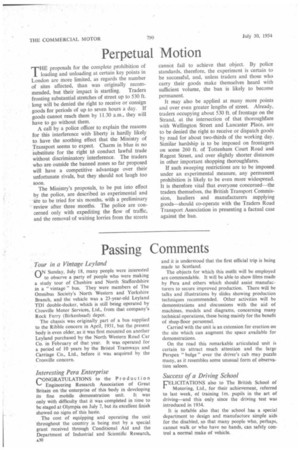Perpetual Motion
Page 32

If you've noticed an error in this article please click here to report it so we can fix it.
THE proposals for the complete prohibition of loading and unloading at certain key points in London are more limited, as regards the number of sites affected, than was originally recommended, but their impact is startling. Traders fronting substantial stretches of street up to 530 ft. long will be denied the right to receive or consign goods for periods of up to seven hours a day. If goods cannot reach them by 1L30 a.m., they will have to go without them.
A call by a police officer to explain the reasons for this interference with liberty is hardly likely to have the soothing effect that the Ministry of Transport seems to expect. Charm in blue is no substitute for the right to conduct lawful trade without discriminatory interference. The traders who are outside the banned zones so far proposed will have a competitive advantage over their unfortunate rivals, but they should not laugh too soon.
The Ministry's proposals, to be put into effect by the police, are described as experimental and are to be tried for six months, with a preliminary review after three months. The police are concerned only with expediting the flow of traffic, and the removal of waiting lorries from the streets cannot fail to achieve that object. By police standards, therefore, the experiment is certain to be successful, and, unless traders and those who carry their goods make themselves heard with sufficient volume, the ban is likely to become permanent.
It may also be applied at many more points and over even greater lengths of street. Already, traders occupying about 530 ft. of frontage on the Strand, at the intersection of that thoroughfare with Wellington Street and Lancaster Place, are to be denied the right to receive or dispatch goods by road for about two-thirds of the working day. Similar hardship is to be imposed on frontagers on some 260 ft. of Tottenham Court Road and Regent Street, and over slightly shorter distances in other important shopping thoroughfares.
If such sweeping restrictions are to be imposed under an experimental measure, any permanent prohibition is likely to be even more widespread. It is therefore vital that everyone concerned—the traders themselves, the British Transport Commission, hauliers and manufacturers supplying goods—should co-operate with the Traders Road Transport Association in presenting a factual case against the ban.




















































































